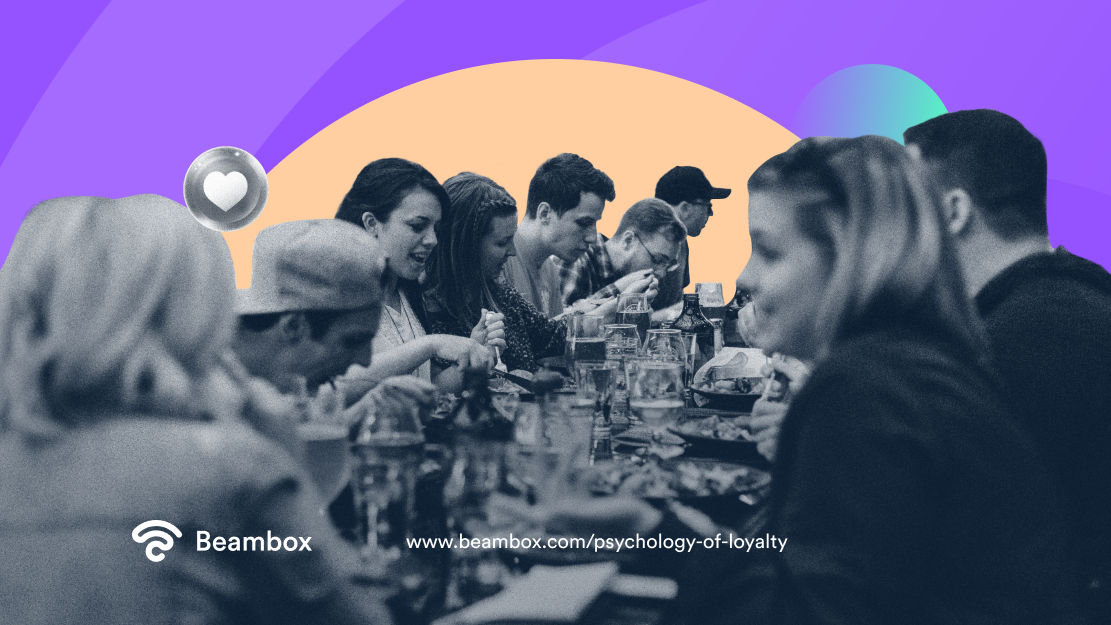Psychology of Loyalty for Business Owners: The Ultimate Guide
Understanding the psychology of loyalty and what drives loyalty behaviors can be a game-changer for most businesses.
In fact, developing long-term loyal relationships with customers is the ultimate goal of most businesses. It is pretty straightforward why:
A loyal customer visits your venue over and over, refers your business to friends and family, and defends your business in front of criticisms.
As multiple books and research uncovered the psychology of loyalty, business owners can take advantage of what science says to grow a solid loyal customer base and lay the foundations for a thriving business.
This article will dive into the psychology of loyalty in layman’s terms to understand what drives loyalty behaviors. Additionally, you will learn what creates loyalty among your customers and employees.
Why Successful Businesses Leverage the Psychology of Loyalty

The most successful businesses in the world strive to create loyalty toward their brand because is a highly rewarding strategy.
This is not a surprise.
Especially in the hospitality and retail industry, leveraging the psychology of loyalty to grow a loyal customer base is fundamental to beating the competition and staying competitive in the long run.
Looking at the numbers, it is clear why:
- The probability of selling to an existing customer is 60 to 70% compared to that of selling to a new customer (5 to 20%)
- 81% of consumers trust recommendations from their friends and family over businesses (loyalty will help drive those recommendations)
- Acquiring new customers can cost 25 times more than keeping those who have already purchased
This list of statistics could go on forever, but the numbers are clear.
Regardless of the industry, loyal customers are the basis for a thriving company.
With that said, what are the drivers of loyalty?
What Drives Loyalty Toward a Business?

To understand how to use the psychology of loyalty to your advantage, you first need to understand what drives loyalty. Here we consider 7 factors that affect the loyalty of a user toward a business.
- Convenience and Accessibility. People are the sum of their habits. When it comes to purchasing behaviors, being the most convenient and accessible place is what truly matters.
- Expectations toward the product. Whatever your core product is, it has to live up to the expectations customers have. Any significant change might lead your customers to look for alternatives.
- Overall Service. People build habits and expectations toward all the components of your business, not only the core product. Consider any component that is involved in the customer experience (e.g. delivery, packaging, etc.)
- Staff and Team members. How your team behaves can truly alter the loyalty of your customers toward your brand. Especially in the hospitality industry, the person who sells the product is oftentimes more important than the product itself.
- Identity. People tend to buy what represents and matches their identity. Think of Starbucks or Apple. Therefore, creating a brand with clear values that match the identity of your customers, is key to growing a loyal customer base.
- Rewards. Customers want their loyalty to be acknowledged and rewarded. A loyalty program that offers any type of advantage (vouchers, freebies, discounts, etc.) is perfect for taking advantage of the psychology of loyalty.
- Reputation. As people want to look good to their peers, the reputation of your business will define who purchases from your business. How your company is viewed by the public will define what types of customers you attract and retain.
How To Use the Psychology of Loyalty To Grow Your Business
Understanding the psychology of loyalty has the ultimate goal to grow your business. You can apply these principles to both your customers and your employees, and harvest the related fruits.
Psychology of Loyalty Applied to Your Customers
Given the psychology of loyalty and its drivers, you must look at your business in its entirety to create a loyal fan base.
In other words, you can’t use shortcuts to build loyalty toward your business. Solid lasting loyalty is built by providing excellent customer service, developing a strong brand identity, and creating a positive customer experience.
Therefore, you have to care about your core product as well as anything that composes the customer experience: atmosphere, staff, events, facilities, and more.
Also, do not overlook your communication style. The language you use and the content you publish on social media will shape the perception of your customers toward your brand (especially when they are not at your venue.)
When all the elements that make a positive customer experience are in order, you can start to look into loyalty and reward programs.
Psychology of Loyalty Applied to Your Employees
When it comes to the psychology of loyalty programs applied to a business, all the attention is turned toward customers. However, you can think at large and consider one of the key components of your success: your employees.
In any business, small or big, fostering loyalty among employees has multiple upsides.
When workers feel like they are part of a team and are valued, they are more likely to go above and beyond for their company. Loyal employees will stay with their company for an extended period of time and will be more dedicated to the company’s success.
Therefore, as a business owner, it’s important to understand the psychology of loyalty with regard to your employees and reap its benefits. Here are a few initiatives and behaviors to foster loyalty amongst your employees:
- Offer incentives and perks
- Listen to their feedback and act on it
- Recognize and appreciate their effort
- Create a positive work atmosphere
- Encourage communication
- Provide regular training
- Delegate. Do not micromanage
Psychology of Loyalty and Programs That Reward Customers. What Is Best?
Understanding the psychology of loyalty can bring multiple benefits to your business. The last step to take advantage of it is to create a program that rewards loyalty.
The most common (and effective) methods are loyalty programs and rewards programs.
Although they sound similar, loyalty programs are different from rewards programs. Additionally, they have different purposes and advantages. Let’s have a quick look at both of them.
Why Rewards Programs Work and What They Are
Rewards programs allow customers to accumulate points, depending on how much they spend on a venue. The cumulated points can be used by customers to unlock discounts or other types of rewards.
Rewards programs are typically available to all customers and anyone can join the program.
The reasons why rewards programs work to grow loyalty are many:
- Easy to understand. The more a customer spends, the more points (discounts) will be accumulated on his account.
- Encourage people to spend more to unlock rewards.
- Easy to set up.
Why Loyalty Programs Work and What They Are
Loyalty programs are created by businesses to reward their regular customers for their patronage and reward loyal customers with something different than simple discounts.
When it comes to retention strategies, loyalty programs remain one of the most established and effective marketing strategies available to businesses. According to the Bond Loyalty Report, 81% of consumers are more likely to keep doing business with brands that offer loyalty programs.
The reasons why loyalty programs work to grow loyalty are diverse:
First, they build a habit. When a customer is incentivized to come back to visit your venue, a habit is in the making. It will be cemented in its behavioral pattern.
Second, they provide fulfillment. In fact, the reason why loyalty programs work so well is that your customers will feel good when they unlock their special rewards.
Third, they encourage loyalty. Loyalty programs are set to make your loyal customers aware that you care about their loyalty. Thus, be sure to reward them accordingly.
If you want to learn more about effective rewards programs, here you can read how to build a Restaurant Loyalty Program that works.
Psychology of Loyalty and Data: A Match Made in Heaven
As you read, you have more than one reason to understand the psychology of loyalty.
Loyal customers are likely to spend more money at your venue, and they are also more likely to visit it more often. In addition, customers who feel connected to your business are more likely to refer to their friends (word-of-mouth marketing) and share their love on the internet with heartfelt reviews. At the end of the day, loyal customers will be your best PR!
However, to understand if your efforts are creating loyal customers, you need to have metrics and data to assess the situation. Collecting data will help you measure your results, redirect your efforts and strengthen your relationship with your guests.
Beambox is an all-in-one WiFi solution that allows you to connect, capture, and learn more about your customers and their preferences. With Beambox you can harness relevant customer data, get simplified reports, and automate your marketing strategy.
There are over 12,000 venues that are taking advantage of Beambox to develop loyalty in their customer base and grow their business. Do you want to give it a try? Do it today by starting your Beambox free trial.
Get Started With Free WiFi Marketing
Beambox helps businesses like yours grow with data capture, marketing automation and reputation management.
Sign up for 30 days free


